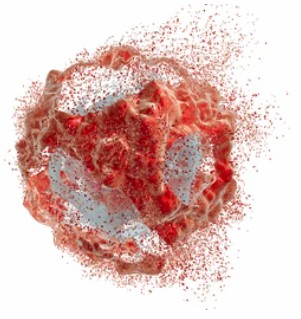Plant cell apoptosis is an essential biological process that plays a key role in plant growth, development, stress response, and plant-environment interactions. The study of apoptosis is important for understanding plant growth and development, improving plant resistance, and controlling plant diseases.
Lifeasible is an industry leader in plant research, and based on our advanced technology platform and specialized research team, we offer comprehensive solutions for plant cell research. In plant cell apoptosis detection, we utilize auroral microscopy or flow cytometry for cell apoptosis detection, which has shown good application results in plant cell apoptosis detection.

Chromosome breakage during apoptosis is a gradual, staged process in which chromosomes are first degraded into large 50-300 kb segments by endogenous nucleic acid hydrolases. Then, about 30% of the chromosomes are randomly severed in nucleosome units to form 180-200 bp nucleosome-DNA multimers in the presence of nucleic acid endonucleases. Genomic DNA breakage thereby generates many exposed 3'-OH ends that can be labeled with deoxyribonucleotides and derivatives formed by fluorescein (FITC), peroxidase, alkaline phosphatase, or biotin in the presence of Terminal Deoxynucleotidyl Transferase (TdT) to the DNA 3'-end, thus allowing the detection of apoptotic cells. This method is known as deoxyribonucleotide end transferase-mediated nick end labeling (TdT-mediated Nick End Labeling, TUNEL). Since normal or proliferating cells have few DNA breaks and thus no 3'-OH formation, they can rarely be stained. Therefore, apoptosis can be detected by fluorescence microscopy or flow cytometry.
TUNEL is the most sensitive, rapid, and specific method for in situ apoptosis detection, which has been widely used in biological research. It can detect the production of DNA fragments at the early stage of apoptosis and can be used directly on tissue sections to observe the location of apoptosis, so it is an apoptosis analyzing method widely accepted and used. It is commonly used in a wide range of applications, including all kinds of walled cells (cell crawls can be prepared), suspended cells (or cell suspensions), and tissue sections.
| Applicable Scenarios |
|
| Sample receiving standard |
|

Lifeasible is dedicated to plant cell research. We offer TUNEL-based assays that are effectively used in plant cell apoptosis assays. If you are interested in us, please feel free to contact us.
Lifeasible has established a one-stop service platform for plants. In addition to obtaining customized solutions for plant genetic engineering, customers can also conduct follow-up analysis and research on plants through our analysis platform. The analytical services we provide include but are not limited to the following:
Get Latest Lifeasible News and Updates Directly to Your Inbox
Adaptive Evolutionary Mechanism of Plants
February 28, 2025
Unraveling Cotton Development: Insights from Multi-Omics Studies
February 27, 2025